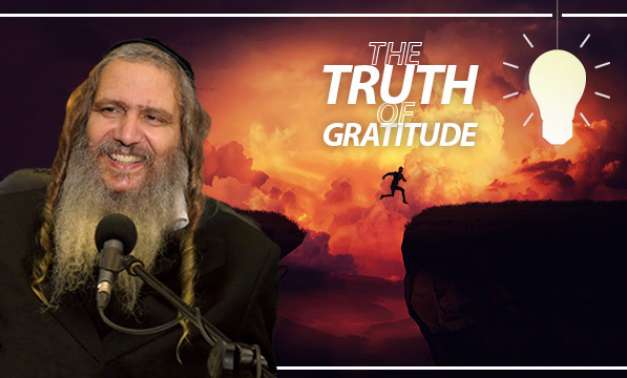
Dr. Emuna – The Evil Inclination is GOOD?!
A reader asks: How could it be that the Evil Inclination is good for us? I thought the “Yetzer Hara” was bad – isn’t that his name, after all?

Rachel, look at this paragraph – I think it’s a TYPO: It says the job of the Evil Inclination is to make us connect to Hashem all day!! That typo was the Evil Inclination at work, no?? ….or did I read it wrong???!!!
It’s a fantastic question, and the answer threw me by surprise the first time that I read it also! But it’s not a typo!!! You read it right.
If everything that Hashem creates is GOOD, then could it be that the Evil Inclination is BAD? Could that be? No. The Evil Inclination is a very good thing – or he wouldn’t be around. Remember, the Gemara relates that the Sages got rid of the Evil Inclination for 3 days and saw that the world couldn’t continue…
So, yes, the point of the Evil Inclination IS to get you to connect to Hashem all day! To come to Hashem in prayer: “Hashem, help me! Hashem, help me overcome this lust! Hashem, help me overcome this bad character trait! Hashem, the Evil Inclination is trying to get me sad and down and that I have no hope – give me emuna in your mercy and my own potential!”
If everything was easy, you would be filled with arrogance and never ask Hashem for help… which means your connection to G-d would be very weak. So yes – the Evil Inclination serves the amazing purpose of helping us get closer to Hashem!
As a side note, the Evil Inclination is also very good because it makes our efforts worth it. If it was easy, there wouldn’t be so much reward – lefum tza’ara agra. Rabbi Arush has talked about this many times, that in our generation it is SO HARD to serve Hashem in holiness and emuna, that the simplest Jew serving Hashem on a simple level in our days is GREATER than the greatest Rabbis of previous generations, and the simplest Jew guarding his eyes or guarding her modest is “the holy of holies”! This is part of the secret of how Moshiach specifically comes in the lowest generation – because our merits are out of this world to serve Hashem on even the most basic level, because it is SO HARD.
We are way too hard on ourselves! The tiniest desire, let alone action towards serving Hashem, praying and increasing our holiness is gigantic in our generation. We think that if we didn’t perform the mitzvah perfectly, then it was worthless. Not so, and certainly not in our generation! Hashem knows that there is a tidal wave against us, so every millimeter gained is beyond massive – and rewarded accordingly.
The key is to APPRECIATE even the tiniest improvement and to thank Hashem for giving us the merit to achieve it, instead of complaining that we didn’t achieve more. This is the crux of everything. If you appreciate it and thank Hashem for it, ignoring all the flaws and faults and accept what you could achieve with humility, then your merit is gigantic!!!
This concept is normal for me now, since I internalized this some time ago. When I translate Rabbi Arush, I don’t add in my own comments to be able to explain what he writes (otherwise you could never learn anything. Almost everything he teaches is interlinked with everything else. The more you learn and then review, the more you understand things you didn’t even realize that he was saying before…)
But, yes – it’s mind-blowing! I find so much of Rabbi Arush’s teachings mind-blowing, and oftentimes the exact opposite of what I thought. The truth he teaches is so simple that it is easy to dismiss it, and yet so deep, that we can forever continue to delve into them and find more and more life-changing advice.
***
Rachel Avrahami grew up in Los Angeles, CA, USA in a far off valley where she was one of only a handful of Jews in a public high school of thousands. She found Hashem in the urban jungle of university. Rachel was privileged to read one of the first copies of The Garden of Emuna in English, and the rest, as they say, is history. She made Aliyah and immediately began working at Breslev Israel.
Rachel is now the Editor of Breslev Israel’s English website. She welcomes questions and comments to her email: rachel.avrahami@breslev.co.il.









Tell us what you think!
Thank you for your comment!
It will be published after approval by the Editor.